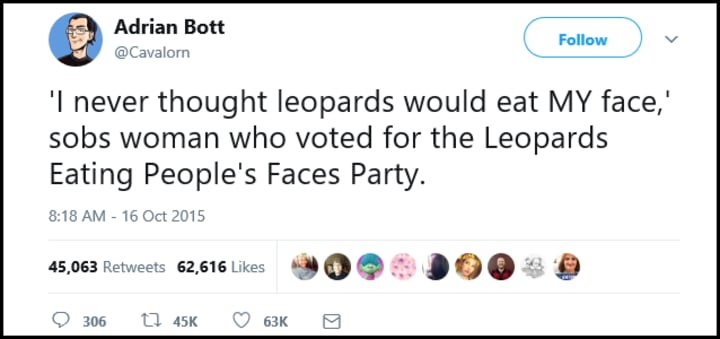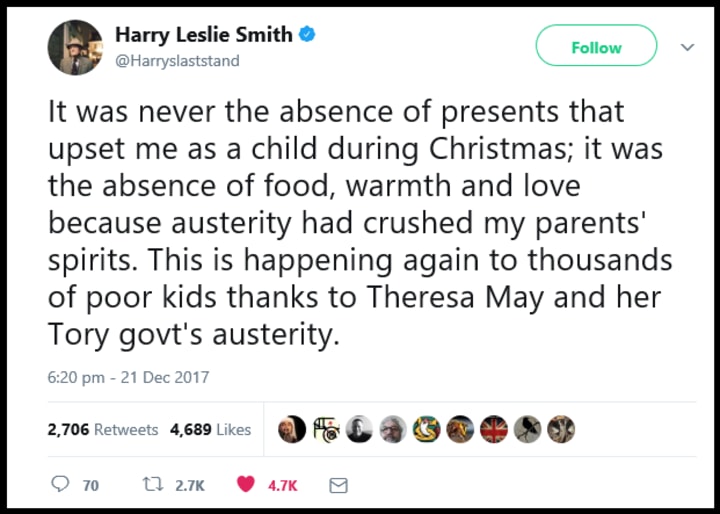What's The Story, Working Class Tory?
It's an identity, and a way of life.

There have been a number of commentators recently that have ridiculed people who vote for things that are bad for them, e.g. working-class Tory or Republican voters. The focus is sometimes on politicians and the media misinforming the uneducated masses. Of course, this is part of the problem, not just in terms of informing voting decisions, but in all areas of politics that affect the everyday citizen.
However, this assumes that the working class are too stupid and lazy to understand the real story, or to want anything better for society. And indeed, people overplay this angle, that the poor must all be a bunch of thickos; why else would they remain poor, right? But that attitude is part of the problem.
“The working class” is not a monolith; it is made up of individuals more diverse than the concepts of different classes, races, or career choices. It might be convenient to assume the poor all think alike, but it’s too easy – there has to be more to it. But still, we want an answer to the question, “Why would you vote for something that you’re repeatedly told will cause you harm?”
Growing up in the 1980s and 90s in the Tory heartlands of Britain, I frequently heard my parents having heated discussions about politics. I was too young to understand or remember most of their conversations, but I definitely remember the discussions happening.
Move forward to the early 1990s, and I recall some of my friends’ parents struggling with their mortgage payments due to the sky-high interest rates that resulted from the ERM crisis that blemished John Major’s Conservative government’s record. Things were not rosy, and yet my parents, while sympathetic to those affected, were strangely silent on that particular problem.
It may have had something to do with the fact that they lived in state-funded accommodation without the responsibilities of homeownership to worry about. Up to this point in my recollection, everything seemed to make sense, and I didn’t appreciate the concept of the political left and right, or the different parties, so I didn’t see anything important in this—our circumstances were different, and that was that.
I knew that my parents were being supported by the state, and that my friends’ parents had obtained their homes through money gained from employment. I knew that that was how it was, and I didn’t question it.
My family had been long-term social housing tenants (my grandparents also had a council house, acquired during a time when social housing was less a marker of poverty, and more about rebuilding post-war Britain). Having also seen their neighbours struggle, my parents saw occupier-ownership as risky—one could lose their home if the economy faltered, or if one lost their job.
In social housing, you were protected, and the local authority was responsible for maintaining the property, so there were no additional costs for repair. Although the Conservatives are well-known for their policies encouraging home ownership, during the 1990s they did also ensure there was provision for those that could not afford it.
You’d think that this alone would be a good reason for working-class families to vote Conservative, and yes—the Conservative Party immediately post-Thatcher had a more human side than either Thatcher’s “no such thing as society”, or the subsequent Tory-lite dreams of Tony Blair.
But John Major was voted out in favour of Blair in 1997, and it is around this time that I really became conscious of my parents’ political leanings. Fair enough, I had been brought up on a diet of the Daily Telegraph and the Mail, but as I didn’t know any different, I never really made any inferences about the schools of political thought to which my parents might belong. In my parents’ eyes, the Labour Party under Prime Minister Tony Blair (and his short-lived successor Gordon Brown) was everything that was wrong with modern Britain.
Blair’s government was far from perfect, but he did a lot of good for a lot of people. Spending on public services and infrastructure was increased, and as a result, the whole country benefitted. However, having started with less to begin with, it would have improved the lives of the poor the most.
But the doctrine of the right-wing press was that Labour was wasteful with tax revenue (which they dressed up as being “our money” as if the poor had personally taken and misused our taxes) and that their progressive reforms were harming the very fabric of British society, by supporting lost causes and degenerates.
Their main targets were immigrants and people on benefits, all painted as unworthy scroungers milking a lucrative existence from the fattened state. My family bought into this idea, even though my parents had themselves been on benefits since before I was born.
Following my parents’ example, I was a working-class Tory in my teens. I genuinely thought that I was better than those other people, that I had dreams and aspirations, and the determination to pull myself up by my bootstraps, get on my bike, and graft my way out of poverty. And truthfully, I did have the ability and motivation to do well for myself and I grasped every opportunity going. I didn’t see why others couldn’t do the same; perhaps they were lazy and stupid, and therefore contemptible. I couldn’t imagine a situation in which I might need to rely on assistance from the state.
The idyllic environment in which I grew up, a council estate in The Garden Of England, did not prepare me for city living. Even though we were poor, I never saw real hardship until I left home. I was fortunate enough to attend university at a time when poorer candidates received higher subsidies to study, and so I was provided for during my initial four years at college.
I could see deprivation in some of the poorer city suburbs, and where there were homeless people, but I still bought into the idea that they had brought it upon themselves and that they didn’t deserve help to get them out of that mess. I didn’t give a second thought to the state handouts I was given to live on campus for four years—I was a worthy recipient because I was using that money to better myself—so I thought. It took years of full knowledge of the harsh reality of the poverty on my doorstep, before I even entertained the idea that capitalism might not be the magical answer to all our problems.
One of the less-savoury aspects of Neoliberalism is that it encourages selfishness. In our current political and economic situation, we’re only a few steps from a full-on re-enactment of Atlas Shrugged. There’s less of a sense of community, and people tend to exist in their own bubbles, with no concern for anyone else’s situation. And the system is like this by design; the only way to live within the system is by taking as much as you can before someone else gets it.
Each household is mainly concerned not with social issues or the condition of public services, but making sure that their balance sheet adds up at the end of the month. Individualism, and the pursuit of money, have become the goals of the 21st Century.
Rich or poor, we’re playing the same game; so we internalise its messages and conveniently ignore or rationalise the parts that speak against us. This has created a feeling, through all strata of society, that the state should play as small a role in people’s lives as possible. Additionally, that to spend on public services is wasteful and benefits the unworthy poor at the expense of the rich.
The thing is that everyone in the UK has the right to the same public services as anyone else. You may also consider it reasonable for richer Britons to pay more tax than those who are less well-off.
But conservative ideology says differently—that we should keep for ourselves as much of our wages as possible, and that if we need to use a particular service, we should pay a fee for it individually, and at the point we need it. There are things to be said about the efficiency and cost of such a system, but it’s rather tangential to this discussion. This idea certainly sounds compelling—only using what we need (there’s always an assumption that others will use more than we do, which isn’t necessarily the case), and having the financial freedom to become a self-made success.
Why should we pay to give someone else a leg-up? They should just work harder, not rely on us for charity.
I do hope they apply the same logic if they become unable to work, or sick, or grow old. That sort of attitude only works if you are already in good health, with money behind you, and have a foolproof means of generating sustained income to support yourself until you drop dead. If you’re poor, and you buy into this way of thinking, it works out fine for you—until something breaks.
It’s a strategy with no contingency built in. What happens when things do go wrong? Of course, you accept the state help while it’s still available, but what about when it’s gone? Sadly, the benefit of having state-funded services allows working-class Tories the luxury of scolding the hand that feeds them while stripping the flesh from its bones. It enables a form of selfishness that blinds one to the fragile reality of the structures that support them.
If you’re starting at the very bottom of the ladder, beliefs like these are terribly harmful. Not only do they keep you in your place, but the effect is magnified as you accept a lot of damaging ideas about yourself. In such a system there exists a two-tier economy, with the rich at the top, believing the poor are where they are through their own failures; and the poor looking up to the rich and believing that one day, they too can have a life like that.
They just need to work a little bit harder—things will get better. It’s the philosophy behind the American Dream; that any of us can build a life of success and riches, if we just put in enough effort. But there are two problems with this ideal:
- That if you don’t make it, it’s because you didn’t try hard enough, and
- That we all begin from the same starting position and that we all have an equally smooth journey.
But no matter how much we’d like it to be true, we still haven’t discovered the elusive meritocracy we keep hearing so much about. Even if we did manage to create it, the rich would complain that a levelled playing field puts them at a disadvantage.
So as well as selling the lie that all the poor need to do is pull their socks up and work for it, it actually pits rich against poor. If you are one of the lucky few that does graft their way out of poverty, you’ll still never be one of them—you don’t have the culture and history of growing up in a privileged world.
You’ll still come across as working-class, no matter how hard you try to disguise it. You’re Nouveau-Riche, your accent’s all wrong, and you don’t know the subtleties of behaviour or the shibboleths that allow you into their club. You need to be constantly reminded how inferior you are.
Those who remain poor, on the other hand, may well hate the rich out of jealousy, but they still aspire to be like them. It’s the draw of power and status that we think we can attain through proximity. And so the poor will often do everything they can to convince others (and themselves) that they actually aren’t that poor at all.
My parents were so proud that they didn’t accept the free school meals that I was entitled to—instead I took a packed lunch with me every day. We didn’t need handouts, we were better than that. My parents would rather make themselves poorer than accept additional help from the state. How many other families in poverty are presenting a façade of doing just fine while struggling to pay the bills? And if they look like they’re doing OK, they can’t really deserve state help, can they? See, I told you they were all a bunch of scroungers, living it up on their meagre benefit checks that “my” taxes paid for!
It’s not just a desire to become closer to the rich; it’s also about distancing oneself from other poor people – as if poverty were a contagious disease. It leads to magical thinking – if I refuse to identify with the social class I belong to, I will be eligible for membership of another. If I shun my peers and look down my nose at them, people will see that I am better than they are, and doors will open to success and riches, etc, etc.
There’s no evidence to back up this theory, but that doesn’t matter. Our brains still harbour evolutionary leftovers that cause us to seek out those who we feel are like us. This further fuels the self-loathing that the system bestows upon those with less money. Ever noticed how chavs always have the latest sportswear and most expensive trainers? A totally inappropriate use of their giro you might say—they obviously can’t be trusted to manage their own money.
But it’s not about having the wrong priorities—there is a need to prove one’s status within that type of community, to show that you’re not as poor and scruffy as other poor people. Where I grew up, the poorest of the poor were called “scobes,” and even though we were all poor, we were in competition with each other to appear as un-poor as we could.
If someone displayed outward signs of poverty, they would be called a “scobe” and get bullied and ostracised because of it. Internalised poor-phobia, which the political climate breeds.
This concerted effort, to distance ourselves from people who are just like us, makes it a lot easier to hate our own social class. We’re not like them, they’re a homogeneous group that is worthy of contempt; we’re better, we’re different. And so we get ordinary working-class people shaming and blaming other ordinary working-class people for the ills of society, and their own problems too.
Why can’t they be more like us? Why can’t they make the effort to better themselves? Sure, I’m poor right now, but things will get better. I just need to keep trying, just keep working that little bit harder.
So we have the rich hating the poor, the poor hating themselves and each other, and a love-hate relationship where the poor both detest and aspire to be like the rich. All we need now is someone for those right at the bottom of the pile to blame for their problems. Maybe these individuals aren’t very capable, or they’ve had a poor education. Perhaps no-one believed in them, so why should they believe in themselves?
My dad talks about “benefit scroungers” and the “grey vote” like they are abstract concepts. He’s 74, and has been on benefits for 35 years. My 33-year-old brother has never worked. But my dad has managed in his mind to “other” the elderly and unemployed, even though he’s a member of both those groups. He cannot understand why he has to pay the “bedroom tax”, and he refuses to believe that my brother’s benefits will be stopped if he doesn’t turn up to every single appointment on time, and apply for 200 jobs that he’ll never get, every week. We’re different, we’re entitled to help, we deserve it. Those other poor people don’t; they’re not like us.
And here we catch another glimpse into the psyche of the working-class conservative. Poorer people voting for the Tories, or for Trump, are clearly voting against their best interests. The politicians have explicitly stated, in their speeches and manifestoes, that they will bring in policies that will punish the poor.
They don’t even dress it up in fancy language, or hide it among a load of other clauses. It’s there in plain sight. And yet in the UK we had working-class Tories voting for benefit reforms that left them poorer even if they were working, cuts to disability benefits, and cuts to the NHS and schools – all policies that make the lives of the poorest and most vulnerable more difficult, no matter how aspirational they are.

It seems tempting to label them as turkeys voting for Christmas, but that doesn’t acknowledge the complex machinations of their grey matter, which neatly reassures them that their conviction is right, even in the face of contradictory evidence. People like to be told things that make them feel good, and cognitive dissonance and denial are a small price to pay for convincing yourself that you are correct.
And that’s the key to this – one’s voting decision is rarely made on a rational basis, after extensively scouring the manifestoes of all those in the running. The party that one votes for is the party that one identifies with. And a great many poor people can identify with neo-capitalist politicians because they aspire to be a part of that class. They’re not really poor, they’re just temporarily-embarrassed millionaires.
There is also a neat solution if you’re beneath contempt from even the very poorest. You don’t have to aspire to be anything other than what you are and what you’ve always been. Blaming women and foreigners for one’s own misfortune is an easy get-out. And right-wing politicians know they can rely on divide-and-rule politics to galvanise the uneducated and disaffected.
But while it really is a distraction from the real social problems that the government has no desire to solve, those who have swallowed this lie are often those who are harmed the most by it. And we can see this played out in the Brexit vote. There were correlations between lower educational level and extreme right-wing views, although the sustained campaign of misinformation the British public was fed over the last 40 years undeniably had an effect.
We were told of all of the “bad” things about the EU (like regulatory reform, higher standards, safer products, all dressed up as “red tape”), yet there was little mention of the benefits, such as investment in our infrastructure, funding for university research, cross-border collaboration on trade, policing and standardisation, and the simple economy of scale that a larger pool of resources can offer. Makes you wonder who decides what’s “good” and “bad”, doesn’t it?
But now, within our slanted view of what the EU is actually for, we can blame them for our “temporary” misfortune as well as women and immigrants. There sure are a lot of people whose fault it is. We believe that we’re “taking back control”, although we don’t know what that really means, and our own government is now debating laws that will strip us of many of the rights we had through our EU membership.
We fought back when there was no fight to be had. The working classes are the ones who would be harmed most by these extreme policies, and by cutting ties with Europe, and yet in their hearts, it is what they wanted. We’ve taken control back from the benign EU, and handed it on a plate to our Malthusian government. Good job, Britain.
We voted for a vague and broad concept in the hope that saying “balls to Brussels” would loosen the shackles put on by our own rulers. We’ve bought in to the lie, and any contrary evidence is “fake news” or “talking Britain down”. And anyway, we’re so far down this route, it would be humiliating to back down.
Of course, there are plenty of working-class folk who don’t think like this, but their voices are drowned out by their misinformed contemporaries and cynical politicians masquerading as “men of the people”. It’s almost like caring for the proletariat has become a concern of the bourgeoisie once again, but at least someone is standing up for us. Plenty of us appreciate the good work that former governments have done to ensure that every citizen has the basics. Our memories are not so short. Some of us also remember a time before Social Security and the NHS, and do not wish to return to those dark days:

Image credit: @Harryslaststand
We elect our MPs to make decisions on our behalf, and we trust them to do what’s in our interests. But when working-class people vote Tory these days, they're being deceived. The public services and social benefits that had been protected for generations are being dismantled and privatised. We’re starting to see the consequences of their actions, and there’s no hiding it anymore.
Previous conservative governments at least offered what sounded like hope to the working class, but now there’s nothing left. All the support that was offered to help the poor live better lives is being stripped away. The means for poor people to help themselves are gone—think about why the government would tell you to pull yourself out of poverty and then deny you the means. The starting conditions of today’s poor are worse, and the journey out of it is longer.
A eoliberal society requires social and financial inequality to function, but how far are we prepared to let it go? While Tory governments of the past may have favoured policies that benefit the rich, our current leaders are carrying out work that actively hurts the poor as well. There’s not enough room for us all to be millionaires, but it doesn’t mean there’s not enough money to go around.
The choice of working-class people to vote conservatively is a simple allegiance, fed by complex emotions and messages. In an individualistic culture, it’s comforting to cling to a set of beliefs that reinforce your views and make you feel like you belong. But it’s a poisonous ideology, built on division and hate.
You can’t see it until you step outside of it, and then you really do see it. YOU REALLY DO SEE IT. There’s no turning back then—it’s as clear as day. You realise the system was built you keep you down, and that the messages you absorbed reinforce that system through your complicity. There’s no room for denial now, it’s just too much.
There’s nothing makes you a socialist as strongly as having lived under extreme capitalism. Maybe if it wasn’t so extreme, we could believe the notion that one can climb from the lowest rung of the ladder to the very top. The slogans, the rhetoric, it all falls away to reveal the philosophy is naked and brutal; not a good fit for the vulnerable, the complicated, the beautiful.
There’s a saying that people become more right-wing as they get older, but human civilisation has moved in the opposite direction. Societies become, overall, less religious, less traditional, more progressive and outward-looking. Today’s UK and US are errant data points in the long history of human development—but we will catch up. When we will wake up from the neoliberal fairytale is another matter.
About the Creator
Katy Preen
Research scientist, author & artist based in Manchester, UK. Strident feminist, SJW, proudly working-class.






Comments
There are no comments for this story
Be the first to respond and start the conversation.